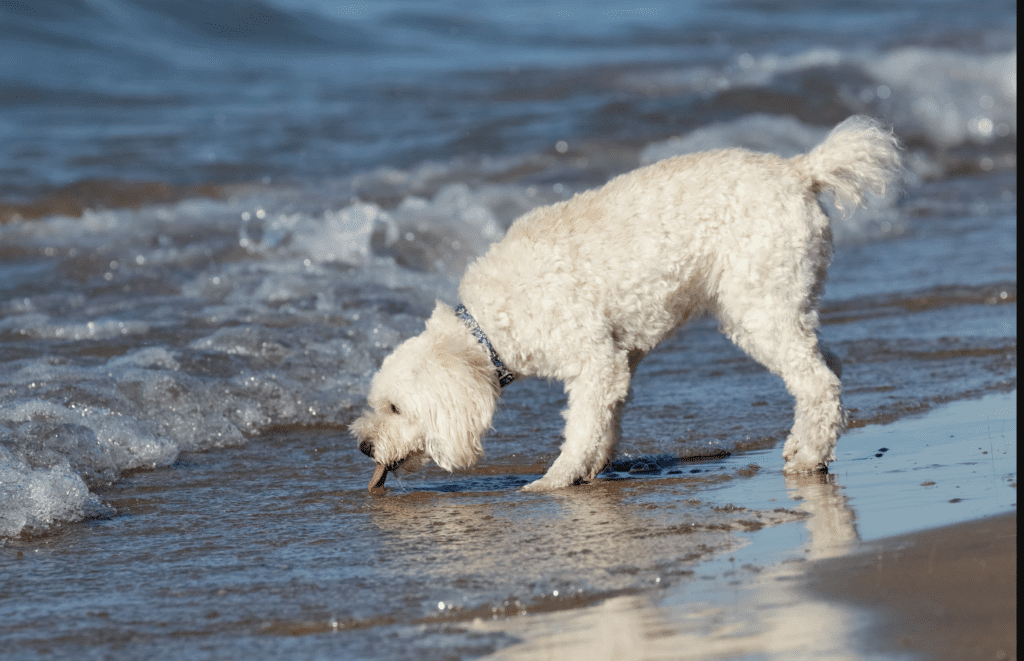
It is the perfect place to unwind and enjoy yourself. For many pet owners, taking their dog to the dog beach is a great way to enjoy a relaxing beach day. The water, sun, and sand that make the beach so enjoyable can also be harmful to pets.
1. Heatstroke can be avoided by keeping them cool
Dr. Libbie For, a veterinarian from Pekin Veterinary Clinic, Pekin, Illinois, advises that you should protect your dog against heat exhaustion or heatstroke. It is particularly important to do this during summer. These conditions are potentially fatal, says Dr. Fort.
Avoid the dog beach during the hotter parts of the day and make sure your pup has plenty of shade and access to cool, fresh water. According to Dr. Fort, keep your dog’s activity at a minimum. You can certainly play fetch with your pet, but make sure that they get plenty of rest time, are out of direct sunlight, and have water between each game.
According to Dr. Fort, if your dog is overly fatigued or panting excessively, you should end the day earlier and bring them inside the air conditioner.
If your dog exhibits symptoms such as extreme lethargy or excessive panting (red mucous instead of pink), diarrhea, and vomiting then you should take them immediately to the vet. These could all be symptoms of extreme heat stress.
2. Do not let them drink salt water

According to Dr. Fort, drinking salty water could cause your dog’s dehydration. Bring plenty of cool, fresh water for your dog and an portable water dish to prevent him from drinking the sea.
If your dog has access to freshwater and eats a little seawater it won’t harm them, but they could become dehydrated if you ingest enough. Vomiting, thick, ropy, and tacky, dry gums are all signs. Dr. Fort suggests that you observe your dog’s normal saliva and gums so you are able to recognize, and hopefully avoid, a problem on the dog beach.
Dehydration can cause your dog to vomit and have difficulty walking.
Dr. Fort advises, “Take them immediately to the veterinarian.” Dehydration is more common in senior dogs, puppies, and animals with health issues.
3. Make sure they are safe in the water
You should also include a pet safety tip on your list of things to do before going to the beach. “Let her practice in a controlled setting,” advises Dr. Robert Trimble. He is the co-founder and director of services for Fuzzy Health. It’s important that she feels comfortable in the water, before you expose her to currents and tides on the beach.
Trimble advises that you should avoid the days with strong currents and look up the tide chart.
Consider putting even good swimmers in a flotation device, says Dr. Fort. In the water, a life jacket for dogs with bright colors and a chin-support flap can keep your pup safe. Always keep an eye on your dog when it’s not leashed. Never turn away from the ocean, says Dr. Trimble.
4. Choose the right sun protection
Dog sunscreen is specially designed for your pet to provide protection from the sun, without having to expose her to harmful chemicals like zinc which can be found in many sunscreens for humans.
Dr. Fort recommends applying dog sunscreen on areas such as the nose and ears where the hair is thinnest.
According to Dr. Trimble, “anything pink or hairless can be at risk of sunburn.” Dr. Trimble recommends that you rub the sunscreen into your dog’s skin thoroughly, and let it dry completely before taking them outside. You don’t just want to slather on the sunscreen and then walk away.
Check your dog for sunburned areas, such as red or inflamed spots. As you check your dog’s body, make sure that its eyes are not irritated from the sun, sand or other elements.
Bring them to a vet if their eyes look goopy, or if they squint more often than normal. It’s always better to be on the safe side than regret, says Dr. Fort.
5. Protect your dogs from parasites
Your pet can be exposed to parasites and harmful bacteria by spending a day at the beach. According to Dr. Trimble, the pools along the beach could harbor bacteria which can cause leptospirosis and kidney failure. Do not let your dog drink or wade in stagnant water pools.
According to Dr. Trimble, there is a vaccination that can help prevent leptospirosis. Consult your vet to determine if the vaccine is right for your dog.
prevents fleas and ticks on dogs. Don’t forget heartworm medication, advises Dr. Trimble.
He says that it only takes one insect to transmit heartworms to your dog.